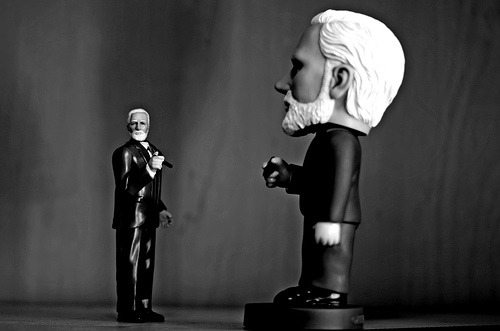
Psychoanalysis and Film at Home and Abroad
Written by Hermine Muskat | Posted by: Anonymous
Why do we love the movies so much? Why do certain stories or characters stay with us to be evoked days, sometimes years later? What makes us use movies as anchors of reference for personal experience or points of departure for creative endeavors? Why do we prefer to sit in a darkened, dreamlike theatre rather than with a DVD in our own home? How do movies interweave with our own personal histories and arouse deep and powerful identifications that get absorbed into our sense of self?
These are some of the questions that were asked and answered at the 4th European Psychoanalytic Film Festival held in London in early November. Psychoanalysts, filmmakers, and academic film theorists from 20 countries met for three days to screen films, listen to scholarly papers, and study how the practice and theories of psychoanalysis can be applied to our understanding of film. The festival was conceived by Italian psychoanalyst Andrea Sabbadini and filmmaker Bernardo Bertolucci to acknowledge and promote the importance of interdisciplinary dialogue between psychoanalysis and film, to foster increased communication between filmmakers and psychoanalysts, and to serve as a central informational clearinghouse for this dialogue in the European community. Bertolucci has been the honorary president since its inception in 2001.
The revolutionary notion of the existence of an unconscious mind as the repository of instinctual desires, traumatic memories, unacceptable ideas and repressed memories was developed by Sigmund Freud, the father of psychoanalysis, in the early 1900s. Such responses as slips of the tongue, day and night dreaming, and random associations, according to Freud, do not happen by accident. Rather they are stored in the mind, in a place that is out of our awareness and can emerge unexpectedly.
Although Freud was an avid appreciator of the arts and wrote prolifically about creative pursuits, he had little interest in the medium of film. He wrote that the celluloid medium was too “newfangled” and could not come close to representing what is central to the understanding of human complexities — or, a sense of the “uncanny” — that something is simultaneously familiar and foreign, frightening yet known, and that a great deal of human behavior is moderated outside of our awareness. But now there is widespread acceptance of how psychoanalytic theory enriches the understanding of human motivation and behavior, that psychoanalytic thought has shaped our culture, and that it can shed light on the close relationship between personal and cinematic stories in significant ways. Modern psychoanalytic theorists agree that the incorporation of unconscious motivation in the narrative of film is distinctly psychoanalytic.
The Festival
The portrayal of children in cinema was the Festival’s focus. On opening night, co-founder Sabbadini noted that “this is the first time we have chosen a theme for the festival…to explore the portrayal of children in cinema with all their ambiguities, imagination and innocence.” Theme-related films were screened and followed by academic paper presentations, panel discussions, and audience participation. Following are highlights from the events I attended.
Laid Down (Emily Cooper, UK, 2006), a short film about life’s first few months is told through the eyes of an infant. Themes of abandonment and attachment and the early formation of selfhood were explored. Zozo (Josef Fares, Sweden, 2005) is the story of a young Lebanese boy traumatically orphaned by a bombing in Beirut on the day that his family is to leave for the safety of Sweden. We are shown, through Zozo’s eyes and fantasies, the incomprehensibility of the adult world and the devastating effects of a childhood of conflict in the Middle East. Caché (Michael Haneke, Austria/France, 2005) a highly ambiguous film about a French family, their disturbing early personal and political histories, and the corrosive, frightening effects of their sense of being watched by someone they might or might not know, brought up many compelling parallels to the analytic encounter of disclosure and being seen.
The theme of surveillance and being observed by a stranger is echoed in The Lives of Others (Henckel von Donnersmarck, Germany, 2006), where we witness Hauptmann Weisler, an East German Stasi officer monitoring the lives of a well known writer and his girlfriend and the curious and tragic results of collaboration and state sponsored oppression. We are drawn into Weisler’s mind as we watch him watching them and we witness the consequences of betrayal. Nina’s Home (France, 2005), Richard Dembo’s final film before his untimely death, is a narrative of a true story of child survivors of the holocaust hidden in an orphanage outside of Paris. Panelists and the audience discussed the possibility of creating art after the holocaust, the effects of cultural dislocation, the trauma of war and loss in childhood. British film scholar Laura Mulvey, chairing a panel on Princess Marie (Benoit Jacquot, France, 2004) discussed how traumatic memories are marked indelibly into the human psyche, how they are preserved through history, and might be recovered in the service of psychic repair.
Brigitte Timmerman is an historian and an internationally recognized authority on The Third Man (Carol Reed, UK, 1948). Following the screening of this 60-year-old film noir classic, Timmerman suggested that a central question of the film is what are the limits of truly knowing another human being? The protagonist, Harry Lime, is a complex, secretive, manipulative shadow figure who people feel they know but do not. This, coupled with the historical depiction of a postwar Vienna, filled with intrigue and twists of fate, the secrets that are kept along with the remarkably sophisticated cinematography fuse into a lament for the Vienna that Freud left behind when he fled to England in 1938. A very lively discussion about film as a pathway to uncovering personal and cultural identity, as a way to continue to remember, and the power of the nonverbal and the almost hallucinated images we see in the film, followed Timmerman’s presentation.
A human face is put on the therapist-patient relationship in the Israeli TV series, In Treatment, a nightly session-by-session look at four patients over the course of nine weeks. The creators of the series, filmmaker Nir Bergman along with two psychoanalysts and psychologist, Roni Baht, Bergman’s scriptwriting collaborator, discussed why the program enjoyed such wide popular appeal. They note that In Treatment is a cinematic example of an intersubjective psychoanalytic approach where we see two people struggling to make sense of things. Viewers experience the mutual influence of patient and analyst in a relationship that is truly co-created. Baht said that his views about psychotherapy are strongly influenced by American psychoanalyst Irwin Z. Hoffman whose book Ritual and Spontaneity in the Psychoanalytic Process is widely read in contemporary psychoanalytic circles in the U.S. and in Europe. In Treatment has been sold to HBO and will be aired in the U.S. in January.
One of the most interesting things about this very rich and exciting festival is the extent to which psychoanalytic ideas dominate film theory and serve as a springboard to look at things Freud never dreamed of. The films screened, the papers presented, and the varied responses from a highly-engaged audience pointed out the very wide and dynamic reach psychoanalytic thought has in shaping our culture and our sensibilities. Clearly, psychoanalysis is inextricably interwoven with our philosophy of what it means to be human.
Closer to Home in Boston
Viewing films through a similar psychoanalytic lens, The Boston Psychoanalytic Society and Institute (BPSI) developed and hosts Off the Couch, a monthly film screening and post-film discussion. Designed ten years ago to affirm the affinity between psychoanalysis and the interpretation of film, Off The Couch provides a place for filmgoers to watch films chosen for their interpretive potential, hear them critiqued by an experienced psychoanalyst, and then partake in open group discussion.
At the November event held at the Coolidge Corner Theatre, Boston psychoanalyst Steven Cooper led a discussion after the Coen brothers’ No Country for Old Men. Cooper observed that the film avoids conventional forms of motivation and character development and is more of an allegorical tale about the search for a quick fix, the grandiosity of youth, irrational destructiveness, and an attempt to understand human weakness and vulnerability in an America overcome with materialism and greed.
“In psychoanalysis, we think and experience events in a nonlinear fashion,” he noted, “as we do in dreams and our understanding of No Country for Old Men is enriched as we experience it in this way.” Cooper suggested that Quentin Tarantino’s Pulp Fiction was a forerunner of this genre of filmmaking and it has certain important parallels to the psychoanalytic method where “we move in and out of feeling states with a certain fluidity and explore those places within and outside of ourselves that we would never ordinarily visit.”
Several people commented on the amount and intensity of violence in the film and the effect this has on the viewer. One man left the theatre because he felt that watching was too painful and abusive. Cooper acknowledged that although the Coen brothers are among his favorite filmmakers, the film was often too violent for him to comfortably watch as well. He discussed how humor somehow took the edge off the horror so that we continue to watch without having to run away, that there is a curiosity and a fascination with people who are so exaggerated and strange, and a certain safety in watching them on film. We want to know why they do what they do and how it will turn out so we are compelled to sit and watch despite the discomfort. One viewer commented that she did not allow herself to care about anyone in the film because she knew they were going to die violently. This raised the issue of being a spectator, of how meaning gets constructed for all of us, and the strong interplay between personal and cinematic stories, between ourselves and what we experience on the screen.
Off the Couch screenings are on the second Tuesday of each month. Before the Devil Knows Your Dead is scheduled for December 11th at the Coolidge Corner Theatre. The discussant will be Judith Yanof, M.D., who is co-chair of BPSI’s film and psychoanalysis committee and a training and supervisory analyst at the Boston Psychoanalytic Institute. See here for more information.
The next European Psychoanalytic Film Festival will be in 2009. Off the Couch screenings are on the second Tuesday of each month. Before the Devil Knows Your Dead is scheduled for December 11th at the Coolidge Corner Theatre. The discussant will be Judith Yanof, M.D., who is co-chair of BPSI’s film and psychoanalysis committee and a training and supervisory analyst at the Boston Psychoanalytic Institute. See here for more information.











